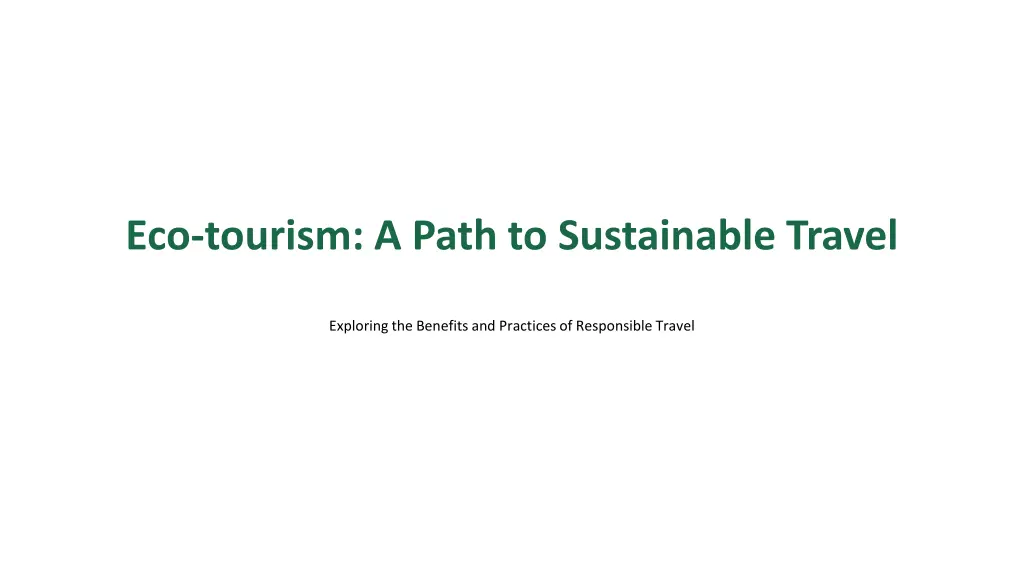
Exploring Eco-tourism: Sustainable Travel Practices
This guide delves into the world of eco-tourism, highlighting its importance in environmental conservation and community well-being. Discover the benefits, destinations, practices, challenges, and future prospects of eco-friendly travel while learning about its positive impact on nature and local cultures.
Download Presentation

Please find below an Image/Link to download the presentation.
The content on the website is provided AS IS for your information and personal use only. It may not be sold, licensed, or shared on other websites without obtaining consent from the author. If you encounter any issues during the download, it is possible that the publisher has removed the file from their server.
You are allowed to download the files provided on this website for personal or commercial use, subject to the condition that they are used lawfully. All files are the property of their respective owners.
The content on the website is provided AS IS for your information and personal use only. It may not be sold, licensed, or shared on other websites without obtaining consent from the author.
E N D
Presentation Transcript
Eco-tourism: A Path to Sustainable Travel Exploring the Benefits and Practices of Responsible Travel
01 Introduction to Eco-tourism Table of Contents 02 Benefits of Eco-tourism 03 Eco-tourism Destinations 04 Eco-tourism Practices 05 Challenges in Eco-tourism 06 The Role of Technology in Eco-tourism 07 Eco-tourism Certification and Standards 08 Case Studies in Eco-tourism 09 Future of Eco-tourism 10 Conclusion and Call to Action
1 Introduction to Eco-tourism Eco-tourism is responsible travel to natural areas that conserves the environment and sustains the well-being of local people. Highlights the significance of eco-tourism in promoting environmental conservation and cultural preservation. Discusses the increasing popularityand demand for eco-friendly travel options worldwide. Explores the core principles that guide eco-tourism practices, including sustainability and community involvement. Compares and contrasts eco-tourism with conventional tourism practices.
2 Benefits of Eco-tourism Eco-tourism supports the protection and preservation of naturalhabitats and wildlife. Promotes the safeguarding of local cultures and traditions throughrespectfultourism. Provides economic opportunities and support for local communities. Offers travelers a chance to learn about the environmentand local cultures. Encourages outdooractivities and a connection with nature, promoting well-being.
3 Eco-tourism Destinations Explore the diverse ecosystems and wildlife of Africa througheco-tourism. Discover the rich cultural heritage and natural beautyof the Asia Pacific region. Experience the vibrant cultures and stunning landscapes of Central America and the Caribbean. Learn about Europe's commitment to sustainable tourism and eco-friendlydestinations. Explore the natural wonders and eco-tourism initiatives in North America.
4 Eco-tourism Practices Tips for reducing your carbon footprintwhile traveling. Ways to contribute positively to the communities you visit. Guidelines for selecting sustainable lodging options. Understanding and honoring the customs and traditions of local people. Opportunities to engage in conservation projects during your travels.
5 Challenges in Eco-tourism The challenge of maintaining a balance between tourism growth and environmental protection. Strategies for minimizing the negative effects of tourism on natural areas. The importance of maintaining genuine cultural experiences for travelers. How eco-tourism can contribute to climate change mitigation. Addressing the financial challenges faced by local communities in developing eco-tourism.
6 The Role of Technology in Eco-tourism How technology is helping travelers make eco-friendlychoices. Exploring natural wonders throughvirtual reality experiences. Using data and technology to enhance conservation efforts. Connecting travelers with eco-friendlydestinations and services. Leveraging social media to promote eco-tourism and environmentalawareness.
7 Eco-tourism Certification and Standards The role of certification in maintaining eco-tourism standards. Overview of international standards and guidelines for eco-tourism. Examples of programs that certify eco-friendly tourism practices. How certification enhances credibility and trust among travelers. Addressing the difficulties in implementing and maintaining certification standards.
8 Case Studies in Eco-tourism A successful model of community involvement in eco-tourism. How eco-tourism supports wildlife protection efforts in Kenya. Bhutan's approachto balancing tourism and environmental conservation. Eco-tourism initiatives aimed at preserving marine biodiversity. Efforts to protect and promote indigenous cultures througheco-tourism.
9 Future of Eco-tourism The growing demand for sustainable travel options. Emerging technologies and practices in eco-tourism. The importance of international cooperation in promoting eco-tourism. How eco-tourism can evolve to address climate challenges. The impact of government policies on the future of eco-tourism.
10 Conclusion and Call to Action Recap of the main benefits and practices of eco-tourism. Encouraging individuals to adopt eco-friendlytravel habits. Ways to get involved and support sustainable tourism efforts. The importance of educating others about the benefits of eco-tourism. A call to action for travelers to commit to sustainable and responsible tourism.
